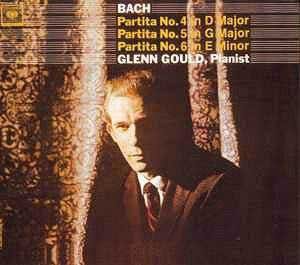This second disc of partitas, containing the fourth, fifth
and sixth partitas, also includes a selection from the nine Little Preludes
from the Wilhelm Friedemann Bach Buchlein. Gould’s recordings of
these works cover a vast period of time; the partitas were begun in 1957,
and other tracks were recorded in 1962 and 1963. Some of the tracks are
in mono (the 5th and 6th partitas, with the exception of their first and
last movements) giving a slightly unbalanced sound overall.
The fourth partita is probably the most balanced work,
having been recorded over a shorter period of time, between November
1962 and April 1963. Gould shows here his great sensitivity to Bach’s
music, especially in the magnificent allemande, which Gould turns into
an anthem of beauty. His legato-less approach fits so perfectly with
the tone of this movement; his muted lyricism is so appropriate. And
when he goes on to the following courante, one familiar with Gould’s
often hyper-fast tempi is almost surprised that he treats this movement
as if it were a sister of the allemande, with a gentle, round touch.
The sarabande of this work features some of Gould’s lightest touch;
again, lyricism wins out over energy, and he constructs this movement
like a subtle poem. It is quite refreshing to hear such a delicate performance
of this fine partita from Glenn Gould - this is one of the finest recordings
of this work for piano.
There is a noticeable difference between the first
movement of the 5th partita and the following movements - not only are
the first and last movements in stereo, and the others in mono, but
the piano is a few hertz off. This difference is apparent when listening
to the end of the first movement and the beginning of the second, for
example, but, in spite of the dampened sound of the mono tracks, it
is not a big problem. Gould here adopts a much more rapid tempo than
for the 4th partita, yet makes it sound almost like no other tempo would
be appropriate. His breakneck rendition of the corrante is surprising,
yet fits the music. He slows down a bit for the sarabande, yet this,
too, sounds correct. Note that Gould does not play the repeats for this
partita, making it very short overall - it is less than 10 minutes long.
(Most pianists play this work in about 20 minutes.) When the final gigue
begins, the listener is jarred by the return to stereo sound, which
opens this music again to its true depth. Alas, if only Gould had recorded
the entire work in stereo…
The sixth partita, like the fifth, has its outer movements
recorded in stereo, while the others are in mono. Gould takes an approach
here that is similar to the fourth partita; he is gentle, round, poetic
and subtle. The opening toccata, at almost 10 minutes, is one of the
longest recordings by a pianist; in fact, of the dozen recordings in
my possession, on piano, harpsichord or clavichord, it is indeed the
longest. Gould approaches this movement as though it were a separate
work, treating each of its sections with a different touch. He begins
at a medium-fast tempo, then slows down in the second section, playing
it like an allemande or sarabande. The difference in tuning of the pianos
between the first and second movements is more noticeable here; there
also seem to be some points in this partita where the tape slurs a bit.
Again, the mono recordings lack depth, but not musicality.
This disc ends with six Little Preludes, which, far
from being filler, show that an artist like Glenn Gould can take what
are banal works written for Bach’s son Wilhelm Friedemann, and turn
them into tiny musical gems.
This is one of the essential Gould recordings of Bach.
His readings of the partitas are some of the finest recordings he made,
and the 4th partita and the toccata of the 6th partita stand as monuments
to his mastery of this music.
Kirk McElhearn


